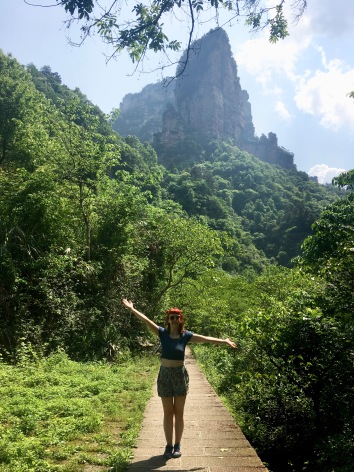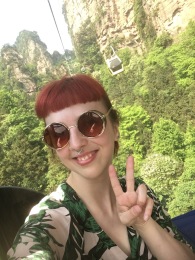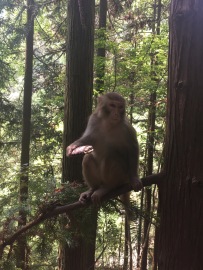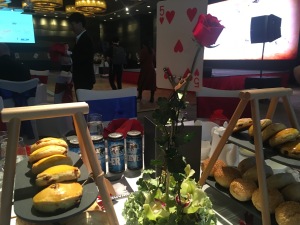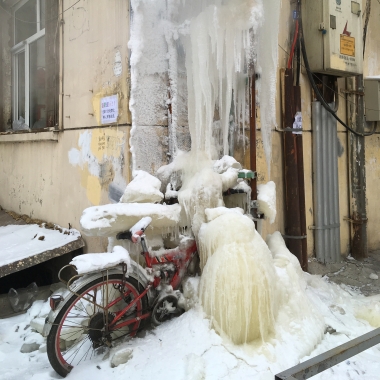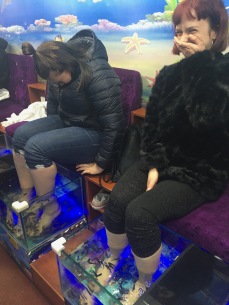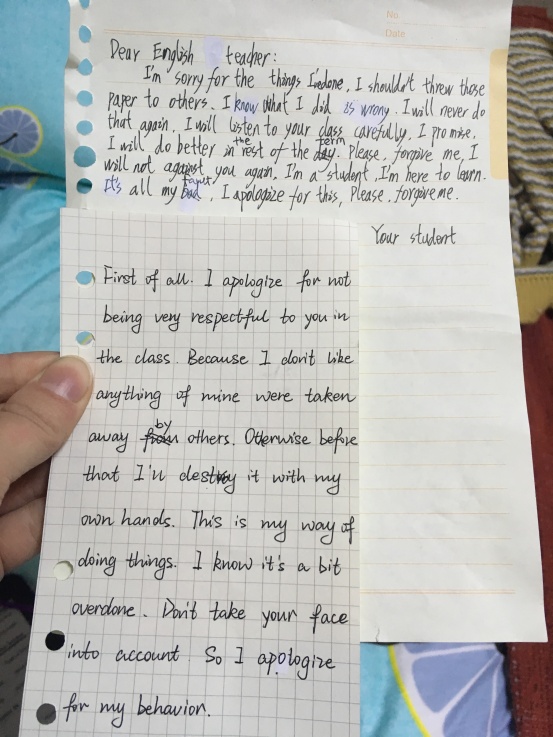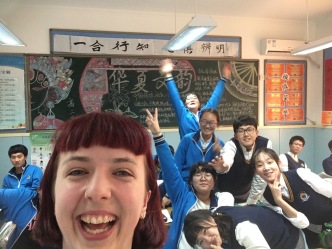It’s almost a year since I applied to the British Council Language Assistant programme on a whim. As the programme in China had the least requirements (you didn’t need to speak any Chinese), it seemed like the best option. While I could have gone for a French-speaking country, I felt like my sub-standard A level in French (done on the Welsh exam board because it’s the easiest) would not suffice. I’ve since realised my naïveté, and that just because you’re not required to know a language doesn’t mean that living in the country will be any easier. For one thing, I’ll probably never be able to read a menu. At present, the only words I recognise in Chinese characters are “hello” and “thank you” and that’s primarily due to a short-lived obsession with Duolingo. Pictures and pointing have become my best friends and are generally how I make my way through most interactions. That being said, five months in I can now add a sentence to my pointing action; “Wo yao zhe ge” (“I want this one”). It’s strange to think I’m almost halfway through my time in China, and as such, it seems like the perfect opportunity for some reflection. Apologies in advance for the duplication; a lot of my highs are simultaneously lows.

Highs
1. Learning that I can survive after being thrown into the deep end
I arrived in Beijing with just four days of training ahead of me. At the training I had a crash course in chopsticks and teaching, both of which I had zero experience in. On starting the job, the school gave me little guidance. I’ve completed e-courses just to do a Saturday job at a camera shop, yet here I was almost clueless in a country where I couldn’t speak the language and about to start a job that I had no experience in. In my first few weeks, my classes all blurred into one and I didn’t know who could speak English and who couldn’t. Five months in, I may not know their names, but I do know their faces and have built a good rapport with my students. There’s the one that loves Taylor Swift, the one that wants to be a hip-hop artist, the one whose role model is Justin Bieber, the one that loves ‘sneakers’, and many more besides.
2. Being ‘the fun teacher’ and my sheer lack of responsibility
It will surprise no one when I say that education in China is taken very seriously and that students are worked very hard. When I tell my students off for napping in my classes (a more frequent occurrence than one might assume) they tell me they get to school at 8am, leave at 9pm, and then do homework till midnight. When I try to do a “what did you do during the holiday?” activity, almost all of my students say ‘homework’ with a resounding sigh of resignation. As a result, English lessons act as a big stress release for the students. We can spend the full 40 minutes playing games or chatting about celebrities so long as my students engage in some form of speaking practice. As I can’t speak any Chinese, it’s generally not difficult to get at least some of the class speaking English.
I can also generally get away with doing whatever I want in my lessons. It wasn’t until a few weeks ago (so a good fifteen weeks into teaching) that I had my first senior class observed. This has also meant my disciplinary measures have been far from traditional, for example, threatening to withdraw my offer of a 10-minute clip of Mr. Bean.
3. My job includes just chatting
It took me a while to realise that it was fine that a group of girls were asking me questions about my hair rather than doing their worksheet, as they were still practicing their oral English. That being said, there are some things I wish my students wouldn’t ask me. Most notably being inappropriate remarks made by adolescent boys, such as “Have you heard of the secret of Victoria?” (Victoria’s Secret has recently come to China). I am, of course, aware that this is entirely part and parcel of teaching pubescent boys and has little to do with my being in China.
4. My short commute
I set off for my classes five minutes before they start. Usually the bell hasn’t even rung by the time I get to the classroom. When I finish at 4pm, by 4:05pm I’ll have already popped the kettle on. Also, if a class is cancelled, I can crawl back into bed and watch a whole episode of Parks and Recreation.
5. Being able to live off what is essentially a part-time job
I teach seventeen classes a week, and as each class is only 40 minutes I work less than 20 hours. On Thursdays and Fridays I only teach two classes a day. My earliest start is 10:05 and my latest finish is 4pm. The school provides accommodation, meaning my only outgoings are on food and leisure activities. And China is cheap. Beijing is expensive by Chinese standards, but you can still get dinner for less than £3. If I weren’t so fond of coffee and cake, I would be a much richer woman.
6. Reaping the financial rewards of being a native speaker
Tutoring opportunities are everywhere in China. Providing you’re a native speaker there is often no preparation required, and you can earn around 300 RMB (£33) per session. While I could have comfortably lived off my teaching salary, it was hard to resist the potential to make a bit of extra cash. A ‘bit of extra cash’ has turned into me almost doubling my salary, which will fund my travels to South East Asia next month, and South Korea and Japan at the end of June.
I’ve also learned that tutoring can be fun. I tutor seven-year-old Linda twice a week and we generally have a great time. We sing songs from Frozen, and she shows me the love notes exchanged between her and her ‘number one’ friend Emma. Each time I see her she gives me a new fake Disney nail that I am required to wear on my little fingernail. As the sessions are held in her bedroom, part of me does wonder whether I am just a glorified babysitter, particularly when I go to the toilet and she turns the light off and I have to say, “Linda! That’s not funny!” Still, it’s a nice break from the staleness of teaching 30+ students crammed into a small classroom.
7. Using my time wisely
Volunteering is a great way to use my time, and I’m lucky to be able to work with charities that do great things here in China. It’s also expanded my social network and allowed me to meet people beyond just foreign teachers. I volunteer for Magic Hospital, Migrant Children’s Foundation and Educating Girls of Rural China.
8. Being able to see the sights
As a teacher, you get most (see low number 3) weekends off. This means I’ve managed to see a number of China’s sights already. I’ve ticked off five of the Lonely Planet’s top recommendations for China, and almost half of the Huffington Post’s list.
Lows
1. Living far from the centre
When researching Fengtai, I discovered that it was featured in an April Fools’ article for being the only place left in Beijing with squat toilets. Arriving in Fengtai, the joke article made more sense as I discovered my nearest Starbucks is a 45-minute walk away (which is saying something, as Beijing has almost as many Starbucks as London). Culture shock hit me hard as I realised I wouldn’t be able to easily immerse myself into city life, as I was in a very residential, very Chinese, district. My nearest subway is a 20 minute walk away, and I remember going to the supermarket three times on my first day as I didn’t know what else to do. Five months in, I could probably do the 20-minute walk to the subway station in my sleep. While the subway is cheap, I do still find it frustrating that getting anywhere takes me at least an hour and a half. Yes, I have a lot of free time, but it does feel like I spend a good proportion of my time in transit.
2. Living on campus
Living on campus, it doesn’t really ever feel like I’ve gone home. I also have to get the attention of a guard to open the gate before I can get back into my room. This is more challenging when it gets past 10pm and the guard is often asleep. In the New Year, there were new guards meaning I experienced an unfortunate incident whereby they were reluctant to open the gate and I didn’t have the vocabulary to say, “Please open the gate”, meaning I just had to turn around and go back to my room. Talk about cabin fever.
3. The weekend is not sacred (and other things being cancelled or rearranged with little notice)
We didn’t find out when we were finishing for Spring Festival (Chinese New Year and the month long winter holiday) until a week before. It was in this same moment that I was told that the school was shut Wednesday, Thursday and Friday and that they’d rescheduled these days to go across two weekends. This coincided with my long awaited trip to Harbin’s ice and snow festival. Despite being 25, I found myself tearing up in the office out of frustration. Thankfully I held it together and in the end some colleagues were able to cover me. All of this is normal within Chinese culture, and we were warned in our training that such things could happen, but it is annoying nonetheless.
4. The repetitiveness, lack of responsibility (I said I’d repeat myself), and lack of guidance
As I’m here primarily to improve my student’s speaking skills, the job can feel a little uninspiring. I’ve had only a handful of lessons observed, and teaching advice has been limited to not teaching anything controversial during the week of National Party Congress meetings back in October. For this reason, it does sometimes feel like my presence at the school is just ticking a box. The lack of guidance from my superiors, and the lack of any kind of target or goal in my work has meant I can feel a bit aimless. I’m like a student but with no deadlines which is fun for a while but can get a bit tedious. I also think if someone told me before I came that I would be teaching five classes of up to 40 ten-year olds with no teaching assistant, I might have thought twice about the opportunity.
5. It can get very lonely
The other day I caught myself explaining to my friend over FaceTime my TV schedule; 30 Rock in the morning, Parks and Rec in the afternoon and the Mindy Project at night. The fact that I have to order my days through the TV shows I watch is a sign that I have too much time to myself.
This leads me onto the point that I’ve found it really hard to make Chinese friends. Like moving to any new city, it’s difficult to make friends to start with. I have colleagues that I chat to but we’ve never met up outside work, and outside of work it’s difficult to know where to begin to meet Chinese people. This has led me to live in a bit of an expat bubble, socialising predominantly with my fellow British Council friends and international volunteering friends. This is also perhaps why my students don’t take me very seriously, as we end up just chatting.
6. Biting your tongue/being asked questions that you can’t really answer
It’s not really a low, but it’s certainly a challenge facing the unpredictable and often provocative questions my students throw at me. A language and cultural difference makes for some interesting remarks, as does the fact that they are teenagers. Most of what they say is harmless, and probably in the same vein as young Westerners, but I often find myself being hyper aware of potential controversies. One student, for example, asked me what my opinion was on ‘LGBT’. Another student asked if it was true that Chinese people emigrating had to convert to a religion. The same student also asked me if any of my friends have HIV. As Google is banned, and Chinese search engines are heavily monitored, I don’t exactly feel comfortable being potentially their sole foreign source of information regarding these issues.
It was always going to be hard coming to China, and considering I only applied to the programme a day before the deadline, I really did go in with little idea of what to expect. When I arrived I didn’t know where to get any home comforts. Now, I know where to get coffee, cake, pizza and much, much more. I also have a newfound obsession with dumplings.
